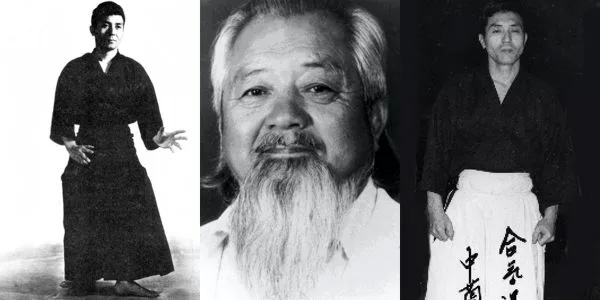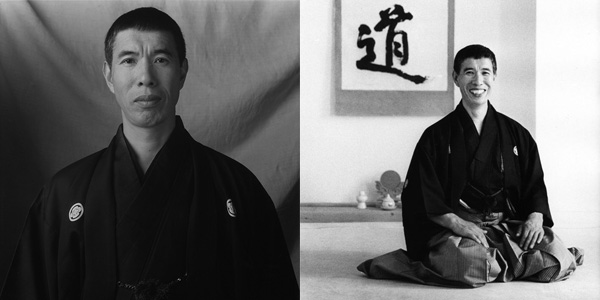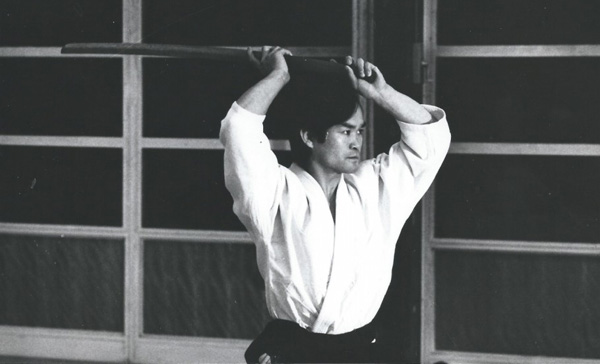The first principle that must be obeyed in combat is ma ai distance. The ma ai for sword, stick, spear and hand, are all different, as is the ma ai involving more than one attacker.
One discipline closely related to and involving an understanding of ma ai is Yadame Jutsu, the deflection of arrows. A master can and will deflect only the arrows which would actually strike him, ignoring with iron control arrows flashing within inches of him. For a swordsman, one of the most difficult tasks is to deal with the changing ma ai of the naginata (halberd) which can be used at close quarters like a sword, then swung in large arcs and thrust like a spear. Great agility is needed to meet this weapon.
Also with the closing of ma ai as in the approach of an enemy, the fighting spirit or ki must become more apparent to the point that when contact is made the warrior is at his highest point of power.
A clash, and I use that word carefully, of masters is something never forgotten once seen.
Zanshin
This is another principle of the bushi, meaning constant awareness. This, of course, is at its highest during battle, but even after the enemy is cut down there is a saying, credited to Toyotomi Hideyoshi, 'After battle tighten your helmet cords!'
More than one warrior has been brought down by a seemingly defeated foe or stumbled over the forgotten body.
Musubi
A concept that all martial arts have in common is musubi. On the surface this can be understood as timing, rhythm, harmonising one's movement with another or others.
Musubi in Judo says when pushed, pull, when pulled, push, thus adding to the attacker's power and by harmonising rather than resisting, upsetting his equilibrium. Aikido, which is more circular, says when pushed, turn, when pulled, enter, then lead the power into a natural technique. This is very basic.
When musubi is understood, one can upset an opponent's timing and not allow him to coordinate. The principle of sen (anticipation) means to feel and see an attack coming, avoid it and strike or throw the attacker. Sen no sen is to sense his attack and counter him during his attack. Sen sen no sen is to sense his intention to attack and strike while he is thinking of attacking.
O'Sensei Ueshiba was capable of throwing an attacker without physically touching him. This involved complete understanding of these principles. O'Sensei said 'When a man decides to attack me, he is already defeated; it is not because I am faster, for speed does not enter into it. He has broken the harmony of the Universe and has already defeated himself'. A poem of O'Sensei illustrates this and describes the Aikido technique of irimi nage (entering throw). 'The enemy approaches, preparing his attack but already I am behind him'.
Makoto
To practice free of desire, lost in the essence of art. Unaware of progress, unattached to attainment, choosing neither this nor that, exhilarated by the flow of the art and the feeling enjoyed through effort.
Tsuke
Tsuke is an instant's collapse of one's guard, the loss of concentration, a moment's distraction or loss of balance. The master will instantly take advantage of any tsuke and will in fact create tsuke in an opponent whenever the chance offers itself. The reaction timing in this is such that there is a saying 'once you can see an opening it is too late to attack'. You should have instinctively taken advantage of the tsuke the moment it appeared.
Mushin
In a confrontation between warriors the thought of win or lose must not come into it. In fact any thought in your head is wrong. The mind must be left clear, mushin ,so that you can react and act naturally. The master will always emerge victorious. One technique, one death, is the way, for there can be little feigning or faking.
Should you try this form of combat in earnest against a man who is integrated and totally dedicated to kill or be killed, there is no hope of victory. (Incidentally this makes nonsense of the points system, or fighting to rules.)
While there were and are specialists in the Bushi arts, "to know one is to know none" could be a samurai axiom. At least a working knowledge of all the weapons in vogue was a prerequisite for all true warriors as one could never tell which weapon one would face on the battlefield. Bushido therefore demanded a study of all weapons systems plus kumi uchi (Grappling) as well as swimming, riding and tactics.
The swordsman does not think of himself as a swordsman. Should he be attached to the sword he may rely on his sword and not see the chance to use his wakizashi (short sword) or tanto (dagger) or his feet or body, or he may be surprised by a handful of sand or rice or other objects thrown at him when he has expected a sword attack.
This principle relates also to tactics.

At a course in Sunderland given by Nakazono Sensei, during a discussion on Aikido philosophy, the Christian concept of 'turn the other cheek' arose. Nakazono Sensei suggested that perhaps we were not allowing this principle to take its full course. Should someone strike us and we offer the other cheek we have not taught him correctly. In fact, we may have misguided him. Perhaps his ego would be inflated and he will continue to attack others until eventually he in turn is beaten.
However, if when he attacks our left cheek we move with his attack, turning the other cheek, offering no violence or resistance, the anger and violence of his own attack will unbalance him. It is a simple matter then to control him and show him the error of his ways. If he has attacked not too viciously he will learn without much trouble. If he attacks viciously he will learn a hard lesson. If he has any common sense he will be a better man for the experience, and if we have proper control of our technique no one is hurt, only the common enemy, ego. Surely these are the thoughts of a gentle man?

Another demonstration I took part in was given by Noro Sensei for some paraplegic children. For the children's amusement Noro Sensei explained that as a child he hated going to school so his father had to get truant officers to drag him there.
At this point the attendant Dan grades substituted as truant officers and dragged a very undignified Noro Sensei the length of the mat to the accompaniment of boos from the children. 'Then,' said Noro Sensei, 'I studied Aikido.' Again we truant officers, six in all, tried just to lay one hand on Noro Sensei and to the delight of the children we started flying through the air, crashing into each other.
With a real effort I did manage to land a relatively powerful blow to the jaw, but unfortunately it was received by on of the truant officers who to this day thinks he was struck by Noro Sensei.
Does this story sit well with the image of the stone-faced, unsmiling warrior? I have worked with paraplegic children since then and envy Noro Sensei’s ability to let them escape from their chairs for the duration of the demonstration.

There are many stories about Chiba Shihan, the man who most embodies the way of the samurai to me, but I will not write them here because nothing I could say or write could give the proper impression. In any case, it would only be my personal impression, just as the words in this article shall remain my impression unless you seek out the experience for yourself.
I will tell you about my last meeting with Chiba Shihan. I had been ill the year before and this had worried my friends and relations who all told me to behave and take it easy. I didn’t listen to them, but when Chiba Shihan came to Glasgow I went to speak with him, and told him of my illness and its effects. When he was leaving to go back to Japan he took me aside and glared at me, pointed his finger in my face and growled ‘DON’T BE ILL AGAIN!’ He was telling me off again. He is the sensei and true to his instructions. I haven't been so ill since!
Although I have written this article I do not profess to have mastered these principles. Any reader who gains benefit owes thanks to the masters I have mentioned. Any mistakes or shortcomings are mine and mine alone.
In conclusion I would like to dedicate this chapter with respect to Chiba Shihan and let a few of his words summarise all that I have tried to say here. These words are written in a copy of Nitobe’s book Bushido which I received as a gift from Chiba Shihan.
